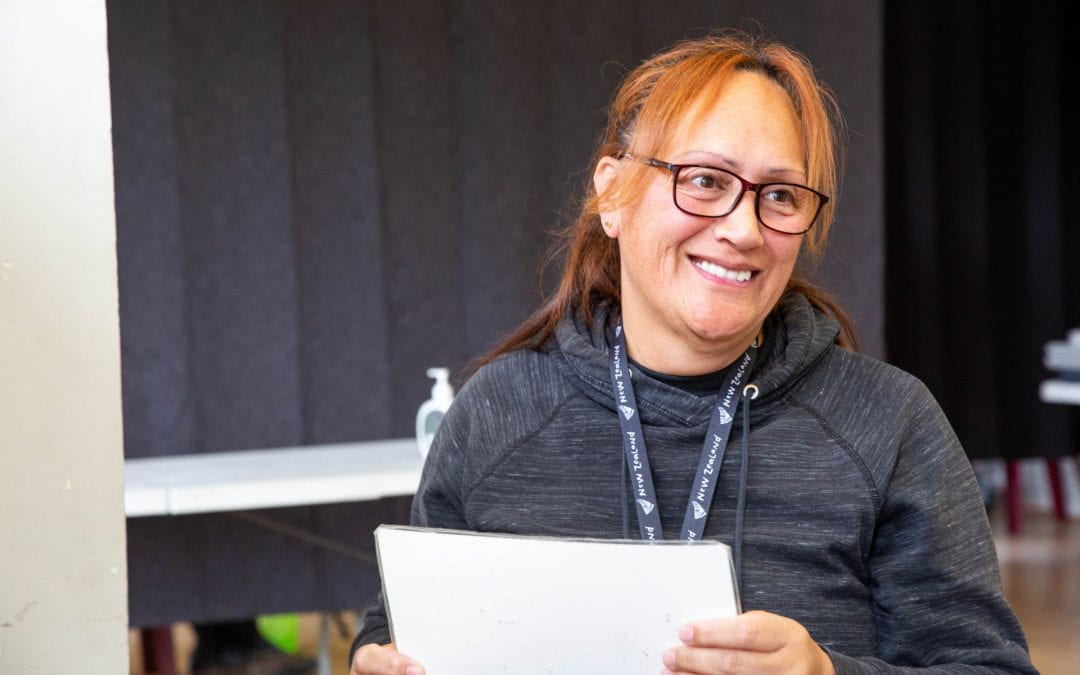
Looking back on past achievements: One research participants’ perspectives on eye care in Aotearoa

Stefanie Faswaller
Participant in the Community Eye Pilot Survey
“Life is wonderful for me, I am confident now when I have my new glasses. It gave me a new life.”
Before she participated in the Community Eye Pilot Study, Stefanie Falwasser had never had her eyes checked by an optometrist or doctor.
That all changed in 2021, when researchers from The University of Auckland’s School of Optometry and Vision Science visited the Auckland suburb of Glen Innes. For six-weeks, a temporary optometry clinic operated out of Te Whare Piringa community centre, providing people with funded eye examinations. Thanks to support of the OneSight EssilorLuxottica Foundation, glasses could be provided for everyone who needed them.
For Stefanie, the situation sounded almost too good to be true. Over the last year, she had noticed that her vision was changing, as she struggled to see smaller details, making it difficult for her to read and complete everyday tasks.
Normally an active participant in her community—a mother, committed to her church and community, and a strong love of sports—Stefanie noticed her confidence slipping away as her vision started to change.
“I was not confident with myself when I was asked by the Priest to read the bible and reluctant to go out shopping when I cannot read the fine prints,” she says.
This loss of vision came with a loss of independence. Increasingly, she found herself relying on others to help her complete everyday tasks—at the doctors, church, and the supermarket.
“I asked for help everywhere I go, if I am not able to read anything,” she says. “I know it was so embarrassing, but I really need to ask for help.”
The cost barrier: a common story
Stefanie’s vision problems could be easily corrected with glasses, but she soon found that these were out of her reach.
“I tried to look and shop around for an optometrist to go and check my eyes. The ones I came across were very expensive and I know that I cannot afford to visit them,” she says.
Drawing on their own experiences, her mother and sister suggested that she purchase a pair of $2 reading glasses from the Pharmacy. While this allowed her to read, this option left her without any reassurance that her eyes were healthy.
Stefanie’s experience is far from unique. The results of the Community Eye Pilot Study found that half the participants with vision loss had never had an eye examination before. Cost is the main barrier that prevents many people from accessing eye examinations or spectacles, because Aotearoa New Zealand has very little public funding for eye care services.
Taking the clinic to the community
In this instance, The Community Eye Pilot Study provided Stefanie with the services that she needed—an eye health check as well as spectacles that were custom-made for her eyes.
Stefanie’s surprise at receiving basic eye care services is telling. While outreach community services such as these have a significant impact on participants’ lives, without government support they rely on the generosity of providers and private companies such as OneSight EssilorLuxottica. Clearly a more permanent funding solution is required so that everyone can access the services that they need.
And the need is obvious to anyone who opens their eyes.
“Our people cannot afford to visit an optometry, let alone purchasing the prescribed glasses,” says Stefanie. “Our people do not have the money, but we need to access the optometry and check our eyes regularly as this is very important for our health.”
We thank Stefanie and others for their contribution to this work.
The OneSight EssilorLuxottica Foundation is a registered charitable organization dedicated to eliminating uncorrected poor vision within a generation. As part of EssilorLuxottica’s commitment to universal vision care, the Foundation works to expand access for millions in underserved communities worldwide. It is also the global collaborating partner of the World Health Organization’s SPECS 2030 initiative, which focuses on refractive error, myopia prevention, and improving access to vision care in low-resource settings.
Find out more at: onesight.essilorluxottica.com



























